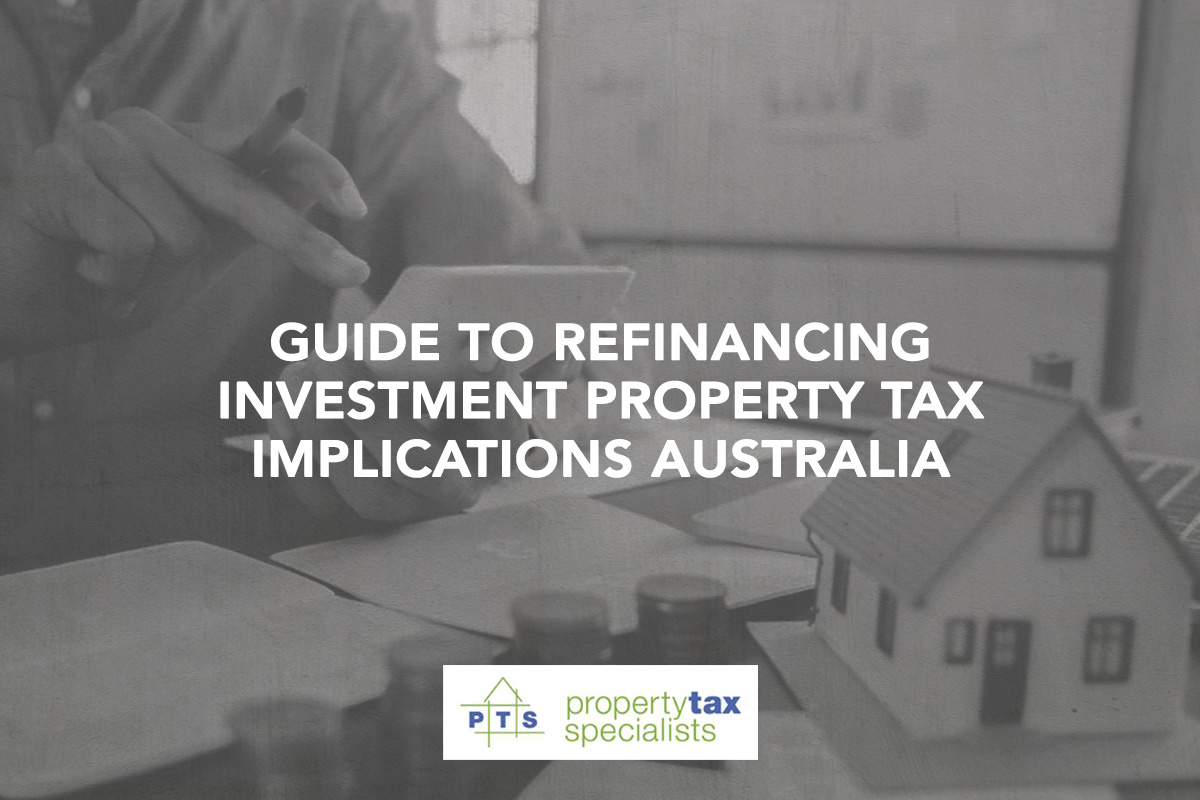Guide to Refinancing Investment Property Tax Implications Australia
As the Reserve Bank of Australia continues to raise the cash rate, many investors with variable-interest loans on their investment properties are feeling the impact. Refinancing may seem like the most suitable option to save on interest and secure a fixed-term loan, but there are several tax implications to consider before making the switch. For instance, refinancing could affect your capital gains tax obligations and tax deductions.
In this blog post, we will delve into the tax implications of refinancing investment properties to help you make an informed decision.
What Does it Mean to Refinance Your Rental Property Loan?
Put simply, refinancing your investment property loan means taking out a new loan to replace your existing one. The process involves paying off your existing loan with a new loan that ideally has better terms, such as a lower interest rate, lower monthly payments, or a more flexible repayment schedule.
Investors typically refinance their mortgages as a strategic move to save money on interest, access equity in their properties, or change their loan terms to better suit their financial goals.
When you refinance, you’ll need to go through the mortgage application process again, and your new loan will have its own set of fees and closing costs.
When considering whether to refinance your home or investment loan, it’s crucial to evaluate the potential benefits and drawbacks with the help of your mortgage broker. Your broker can help you compare different loan options, calculate the costs involved, and assess whether refinancing is the right decision for your financial situation.

Can You Claim Tax Deductions for the Refinancing Costs?
Although investors must pay income tax on any earnings they generate from their investments, the Australian Taxation Office (ATO) allows investors to claim various tax deductions and offsets to reduce their tax liability.
For example, investors can claim deductions on interest payments, council rates, repairs and maintenance, and depreciation of assets. Additionally, if an investment generates a loss (i.e. it’s negatively geared), the investor can offset it against their other taxable income to reduce their overall tax bill.
You may be interested in reading about these 11 investment Property Tax Deductions You Can Claim.
In addition to these tax deductions and potentially lowering interest rates, refinancing an investment loan can offer a few tax benefits for investors – one such benefit being the ability to claim tax deductions for the borrowing costs you incur from refinancing your mortgage.
Investment property owners may be able to claim tax deductions for the following borrowing expenses:
- Valuation fees charged by the lender
- Any title search fees charged by the lender
- Early discharge fees
- Loan establishment fees, including application fees
- Fixed-rate loan break fees
- Mortgage broker fees
- Lenders mortgage insurance
What Are the Rules for Claiming These Costs as a Tax Deduction?
There are a few rules you have to keep in mind when claiming a tax deduction for your refinancing borrowing expenses, including the following:
- When the total amount of borrowing expenses exceeds $100, you can claim the deduction over the loan term or five years, depending on which period is shorter.
- If the total refinancing costs amount to less than $100, you can claim the full deduction in the same income year that you incur them.
- Should you repay the loan within a period shorter than five years from the time it was taken out, you are eligible to claim a deduction for the balance of the borrowing expenses in the last year of repayment.
- If you obtained the loan during the income year, you must divide the deduction for the first year proportionately based on the number of days the loan you held during that year.
Example:
The Johnsons refinanced their investment loan and took out a new loan of $280,000 for a term of 15 years to purchase a rental property for $220,000 and finance a new car for $60,000.
To secure the new loan, they incurred $2,150 in establishment fees, valuation fees, mortgage broker fees and early discharge fees.
As their borrowing expenses are more than $100, the ATO requires them to spread the deduction over the loan term or five years, whichever is shorter.
Since a part of the loan ($60,000) was used for private purposes, they can claim a deduction only for the rental property loan’s portion of the borrowing expenses.
Assuming that the loan was taken out on 5 September 2022, the Johnsons would calculate the borrowing expense deduction for the first year as follows:
Borrowing expenses x (number of days relevant in the year ÷ number of days in the 5-year period) x (amount of rental property loan ÷ total amount borrowed) = deduction for the year.
Their borrowing expense deductions in the following years should be worked out as follows:
Borrowing expenses remaining × (number of relevant days in year ÷ remaining number of days
in the 5-year period) × (amount of rental property loan ÷ total amount borrowed) = deduction
for the year.
| Year | Calculation | Available Deduction for the Year |
| 1 | $2,150 x (299 ÷ 1,826) x ($220,000 ÷ $280,000) | $277 |
| 2 | $1,798 x (365 ÷ 1,477) x ($220,000 ÷ $280,000) | $349 |
| 3 (leap year) | $1,354 x (366 ÷ 1,112) x ($220,000 ÷ $280,000) | $350 |
| 4 | $908 × (365 ÷ 746) x ($220,000 ÷ $280,000) | $349 |
| 5 | $464 × (365 ÷ 381) x ($220,000 ÷ $280,000) | $349 |
| 6 | $20 × (16 ÷ 16) x ($220,000 ÷ $280,000) | $16 |

Will Refinancing Impact Your Capital Gains Tax Obligations on Rental Properties?
Capital gains tax (CGT) is a tax that the ATO levies on the profits made from the sale of an income-producing asset, such as your investment property. Your capital gain or loss is essentially the difference between the sale price and the property’s cost base. In other words, you pay CGT on the increase in value of your property during the time that you owned it.
Some costs you incur when refinancing your loan aren’t tax deductible, but you can add them to your property’s cost base. These expenses are typically referred to as “capital” costs and include:
- Stamp Duty
- Legal expenses such as conveyancing fees
- Private valuation costs
- Inspections
By adding expenses to the cost base of your property, you can effectively reduce the amount of capital gains tax you will need to pay when you sell it. Therefore, it is advisable to retain receipts for all of your capital expenditures and consult with your tax agent and accountant about this matter.
Key Takeaways
Refinancing your investment property can offer many benefits, such as access to better interest rates, increased cash flow, and the ability to access equity for further investment. Additionally, investors may be able to claim deductions on the refinancing costs incurred.
Always weigh the costs and benefits of refinancing and consult with a mortgage broker and tax professional to ensure it aligns with your financial goals and situation.
If you need tax advice regarding your investment property refinancing, don’t hesitate to contact Property Tax Specialists for expert guidance.
DISCLAIMER: This information has been prepared without taking into account your objectives, financial situation, or needs. Because of this, you should, before acting on this information, consider its appropriateness, having regard to your objectives, financial situation, or needs.
Amir Ishak is a Limited Authorised Representative 1269908 of Merit Wealth Pty Ltd, Australian Financial Services Licence 409361, ABN 89 125 557 002


